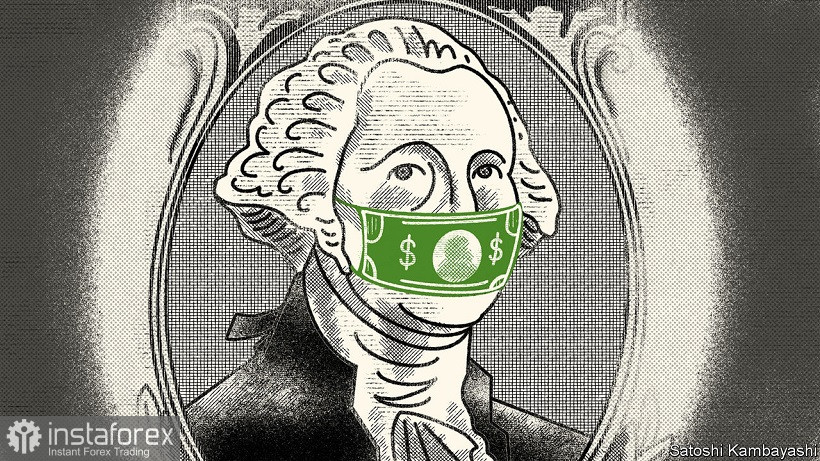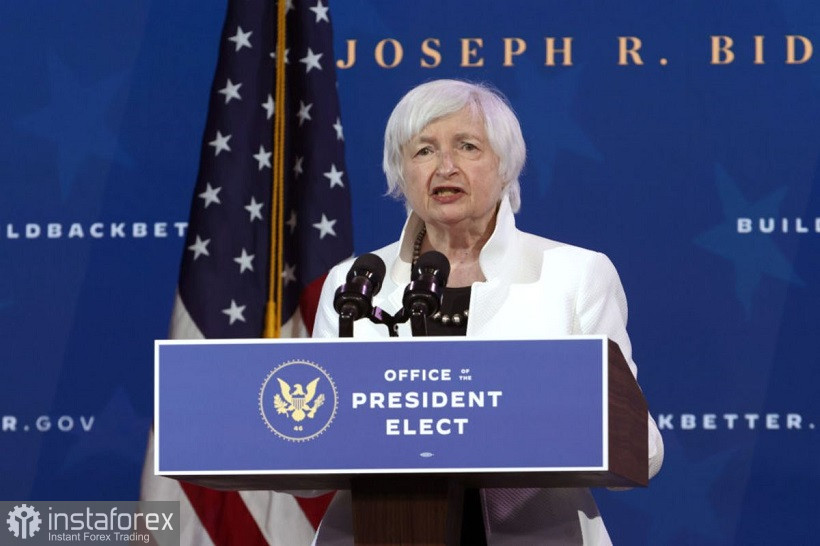The US dollar index continues to stay above the 90-point mark, indicating the increased demand for the US currency. The indicated currency keeps its positions not only amid panic about the new COVID-19 strain, but also due to other fundamental factors. In particular, the USD bulls strengthened their position after Bloomberg's powerful publication, in which experts suggested that the new US Treasury Secretary, Ms. Janet Yellen, would pursue a strong dollar policy. Brexit also indirectly supported the US currency, wherein serious issues are also unfolding. In other words, the final events this year are such that market participants are nervous. All this hype allowed the US dollar to partially recover its lost positions, although the overall market situation is highly uncertain.

Let's start with the so-called "UK's mutant", as some journalists dubbed the new COVID-19 strain. This new type of coronavirus discovered in the UK has provoked a serious panic throughout the markets, including the currency one. In particular, the euro/dollar pair declined by more than 100 points yesterday, but it regained its lost positions before the day closed. The lack of clear information regarding the new strain made the markets nervous yesterday, resulting in inconsistent price movements. Initially, the dollar gained impulse, but then lost its gained points again. At the same time, macroeconomic statistics faded into the background, as traders primarily reacted to comments from virologists and representatives of relevant ministries (Ministry of Health) in Europe and the UK.
According to the results of yesterday, a more or less clear preliminary picture emerged about the "British mutant". The bad news is that the mutated form of coronavirus does appear to be more contagious, although experts still can not determine the degree of contagion relative to the normal strain. Many experts say that the figure announced by Boris Johnson – 70%, is not entirely correct, since it has not been confirmed experimentally and is based only on computer modeling. The good news is that the new strain will not affect vaccination – that is, the strategy to combat COVID-19 remains the same and does not require any changes. Simply put, pharmacologists do not need to develop a new vaccine, spending priceless time and huge amounts of money on it. In addition, experts believe that there is currently no evidence that the new strain leads to a more severe course of the disease. Due to this, the Euro recovered again its lost positions before the closing of yesterday's trading, returning to the area of 1.22 level.
On the other hand, the situation has not yet returned to normal. The new COVID-19 strain has not yet been studied much, so many countries of the world, including members of the European Union, stayed away from the UK. The general nervousness and uncertainty did not allow the EUR/USD bulls to develop a further upward offensive: traders retreated from yesterday's price high to the base of the 22nd market at the end of the Asian session today.
The US dollar, in turn, received unexpected support from Bloomberg. Yesterday, journalists of the news agency published a detailed material dedicated to Janet Yellen, the future US Treasury Secretary. The subject of the article is that her appointment to the White House will help the administration formulate "a more coherent policy on the dollar." At the same time, some insiders reported that Joe Biden's economic advisers are persuading Ms. Yellen to return to the strong dollar policy. There are some reports that say that the future minister agrees at least not to hinder the revaluation of the national currency. Not a single president (before Trump) complained about the overvalued dollar, while the US pursued a policy of a strong national currency over the past 15 years (since 1995). Bloomberg reporters recalled that in the role of the Fed's head, Janet Yellen often spoke about the advantages of a weak dollar in the context of rising inflation and a favorable impact on the export sector. However, in her ministerial role, the former Fed's head will not repeat the above theses, which will maybe help strengthen the US dollar.

Such assumptions of the influential publication helped sellers of EUR/USD to restrain buyers' attacks. Today, the bearish mood for the pair has begun to prevail again. Many factors put pressure on the pair such as Brexit uncertainty, new US sanctions against high-ranking officials of the Chinese Communist Party, nervousness about a new strain, and a sharp decline in US Treasury yields.
In fact, the market ignored that the US Congress approved a new stimulus package worth $ 892 billion. However, this fundamental factor was played out yesterday, when politicians announced that they had reached a compromise agreement. The final vote was just a formality.
Thus, long positions on the EUR/USD pair look extremely risky now, given the combination of the above factors. Sales are uncertain which was proven by yesterday's price dynamics. Therefore, it is recommended to take a wait-and-see position for the pair. If we talk about short-term prospects, then the price may further decline to the nearest support level of 1.2175 (Tenkan-sen line on the daily time frame) within the day. The main support level is located slightly below it, which is around 1.2110 (lower line of the Bollinger Bands indicator on the same time frame).





















